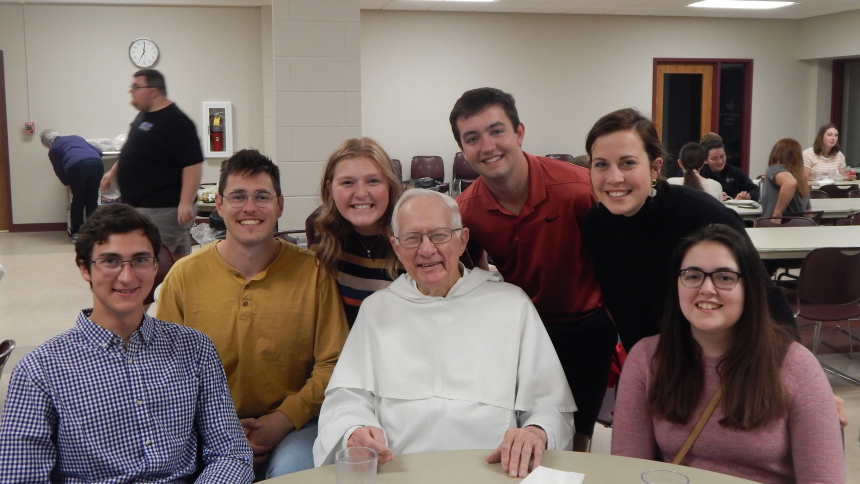
BLOOMINGTON, Ind. (CNS) - There is the black-and-white photograph of the young Dominican priest floating along the Niger River in a canoe in the early 1960s, pointing into the distance, uncertain what awaited him in this vast, mission territory.
There also is the moving story the priest shares about the time he prayed the Stations of the Cross with a community of people with Hansen's disease, as leprosy is called today.
The photo and the story are all part of the 57 years that Dominican Father Justus Pokrzewinski spent in Nigeria, serving as a missionary bringing the Catholic faith to a people unfamiliar with Jesus.
Now, having celebrated his 90th birthday Dec. 10, Father Pokrzewinski is nearing his fourth year of ministering to college students at the St. Paul Catholic Center on the campus of Indiana University in Bloomington.
Two different worlds, but one common goal for Father Pokrzewinski: sharing the joy of Jesus.
He knows many of the students and is especially supportive of missionaries with FOCUS, the Fellowship of Catholic University Students, who minister around the campus. And the students love this priest who is known for singing hymns around the parish office and who always takes time to greet everyone who crosses his path.
"He's a very holy man who brings a lot of joy to everyone," said Maria Reecer, an Indiana University sophomore who works part time in the parish office and is a member of the parish.
"I think he's a great testament to what faith does for someone when they pursue it throughout their life," she told The Criterion, newspaper of the Archdiocese of Indianapolis.
Father Pokrzewinski's missionary work in Nigeria also inspires the FOCUS chapter. He spoke to the group about his experiences, and they left the meeting eager to continue their outreach.
In both Bloomington and Nigeria, Father Pokrzewinski views missionary work from a similar perspective.
"The missionary progress depends on God's grace, on the gift Jesus gave us in the holy Eucharist, as the memorial of his passion, death and resurrection, on the Holy Spirit, and also on Our Lady, Queen of the Apostles," he noted. "All the glory of any success goes to God."
Growing up in Chicago, the future priest learned about religious life from his parish and school.
His graduated from St. Stanislaus Kostka grade school, which was staffed by the School Sisters of Notre Dame. The parish was staffed by the Resurrectionist Fathers. His family also had strong Catholic roots that went back to Poland.
"I give thanks to almighty God for the gift of my life and my Catholic faith, and my parents' Catholic faith. Everything flows from that," Father Pokrzewinski said. "All the sacraments -- from baptism, penance, holy Communion, confirmation -- led me to the Dominican order and the priesthood."
He was ordained June 4, 1960, and was assigned to minister in Nigeria the following year.
His Dominican order -- whose charism is preaching for the salvation of souls -- had been invited to minister in the west African country in 1951. They were given two apostolates: a parish in Lagos and the prefecture of Sokoto in northern Nigeria, which was to be developed into a diocese.
"Our job (in Sokoto) was to build the diocese up and to hand it over to the diocesan priests," he says.
The Dominicans did their best to learn Hausa, which was the main language. They also tried to build bridges with the Muslims, who controlled much of the region. The Muslims told the Dominicans they could minister in the region if they built a hospital, which the order did. Dominican sisters from Kansas operated it and two other clinics.
"Lay missionaries who were nurses helped the sisters run these places," Father Pokrzewinski notes. "It was a very Dominican thing - with the priests and the Dominican sisters and the lay missionary nurses. The work went well."
As missionaries, the Dominicans were charged with spreading the Gospel and introducing the Nigerian people to Jesus Christ. Father Pokrzewinski said one breakthrough occurred with a small group who spoke Hausa but were not Muslim.
"How did we find them? ... They were different from the Muslims because they drank beer," he said with a laugh. "That was one way to meet them.
"We saw it was important to (minister to) them. Most of the Christians were coming from the south. ... So, we succeeded in that area a bit."
When he baptized children, the priest told their families, "This is a great gift, but you're going to suffer for it," referring to the strong Muslim presence in that area of Nigeria. And that suffering continues for many Christians there today.
During his nearly 20 years in the Sokoto Diocese, Father Pokrzewinski worked in parishes, viewing his primary mission as evangelization. The Dominicans were building parishes with mostly people from the south and trying to introduce the indigenous people in the north to the Catholic faith.
"In the north, no one had ever preached about Jesus," he said. "It's wonderful to preach to people who never heard the good news."
In 1980, Father Pokrzewinski moved to the south and ministered in the Ibadan Archdiocese. His 37 years there included mission work in Ibadan, Lagos and Agbor-Obi.
He served in various leadership roles during that time with the Dominican order and also as a pastor. During visits to villages, he took note of how important native catechists were to introducing and passing on the faith.
"They were really our right hand. They knew the language, and they knew English, and they would often interpret for us. There are many dialects in Nigeria," he said. "There are maybe 20 languages, but each one of them had different dialects, almost up to 200 if you counted them all."
One story revealed how a catechist's work offered an example of faith in action
"We were getting converts, and we told our people, 'The tabernacle, that is Jesus, the body of Christ. He's in there,' " Father Pokrzewinski recalled. "So, they would tell their friends.
"One time, a young man - not a catechumen yet - he asked me in the Hausa language ... 'Is God in that box?'"
"I said, 'Yes, that's the tabernacle. Yes, he is.' ... That was kind of a thrill to see how they were sharing the faith, and the way he put the question."
Promoting priestly and religious vocations also was an important part of Father Pokrzewinski's mission. Reflecting on trying to plant seeds for vocations, Father Pokrzewinski admitted, "It was slow going at first."
Years later, more men are answering the call.
"There were nine (Dominicans) ordained priests this year, and eight deacons" - all Nigerians, Father Pokrzewinski noted. "We're happy with that. Nigeria is rich in vocations."
Near a parish in Agbor-Obi where Father Pokrzewinski ministered for two years was a community run by a group of religious sisters for people with Hansen's disease, as leprosy is called today. One day, the sisters asked the priest to celebrate a Mass and participate in the Stations of the Cross afterward.
"As we would kneel down (while praying the stations) ... there was this leper ahead of me, and when he knelt down, there was his leg, all eaten up from leprosy. I felt sorry for him, but then it struck me, this guy was kneeling and rising faster than all of us," the priest recalled.
This man was "just thrilled to be saying the Stations of the Cross," he said. "He just saw what Jesus did (as we reflected on the Stations). ... We don't like to suffer, and here is this guy doing this."
"Just seeing his leprosy and seeing his spirit" really moved Father Pokrzewinski.
Even on campus in Indiana, Father Pokrzewinski keeps the people of Nigeria close to his heart.
But with sadness, he also cited "the serious sufferings" of Catholics and other Christians in some parts of northern Nigeria.
"Many have died, not only from Boko Haram fanatics, but many have died at the hands of some Fulani cattle herdsmen," the priest said. "Government protection is needed for the Catholics. There is a great need to stop these persecutions. The faith of the Catholic people is strong, but they need our prayers."


